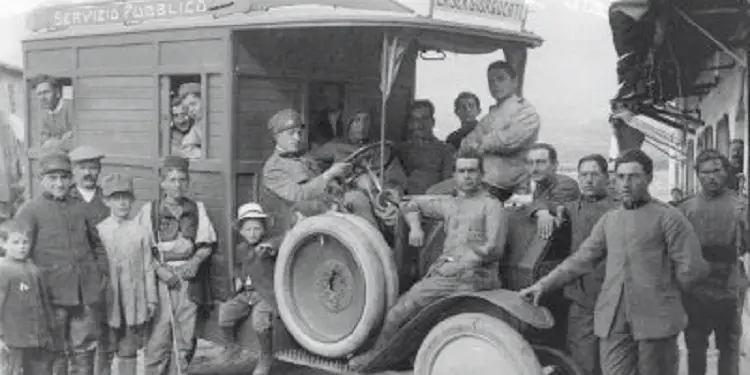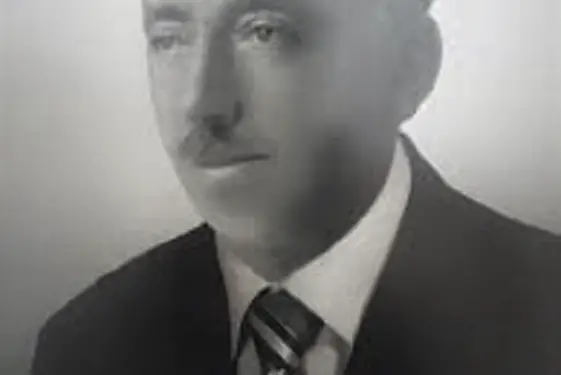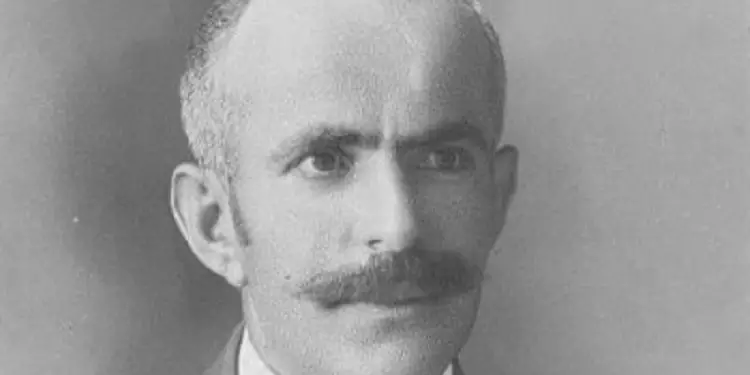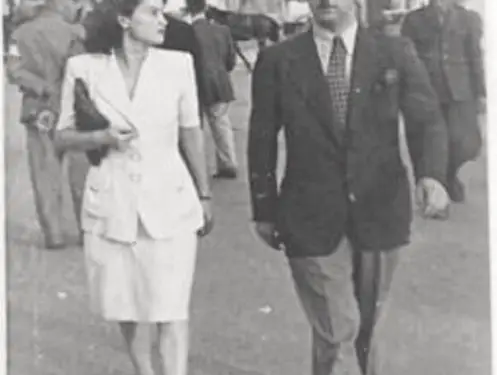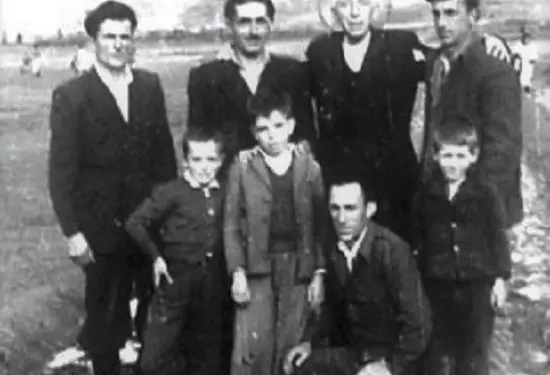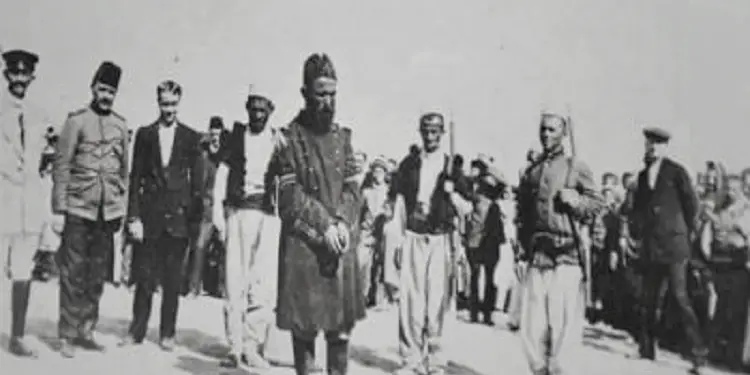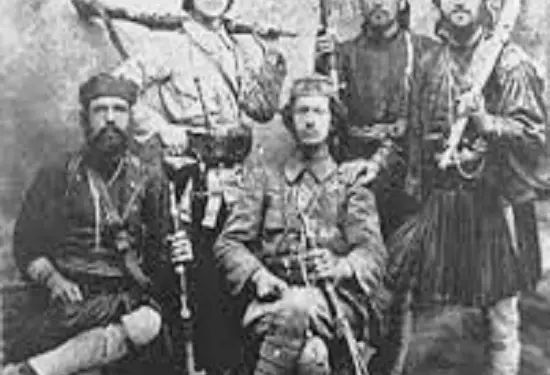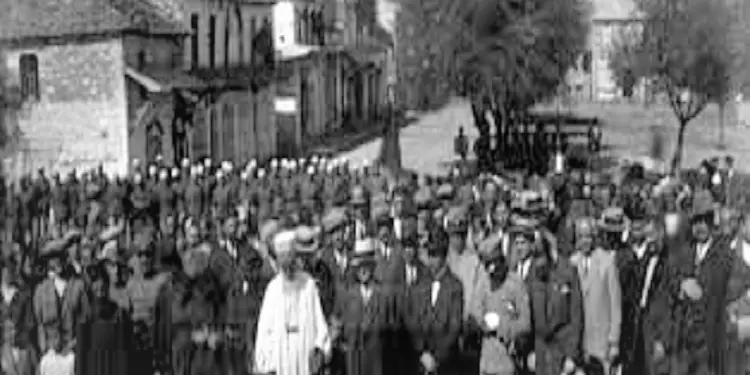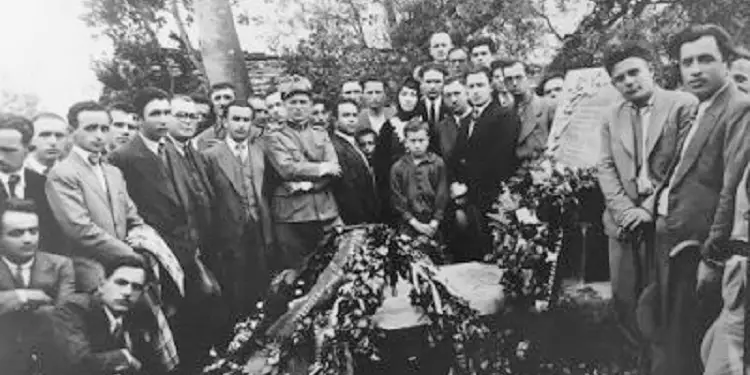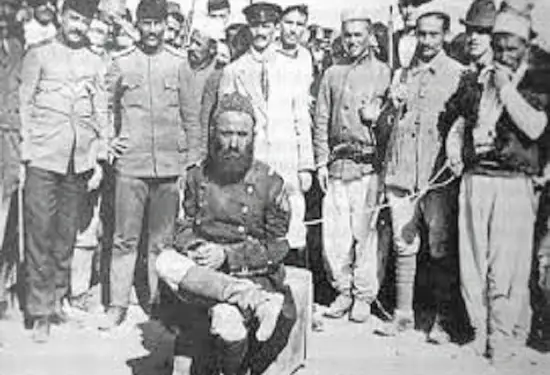Dashnor Kaloçi
Memorie.al publishes for the first time the unknown memories of Zejnel Prodan, former mayor and one of King Zog’s most trusted people during the years of the Monarchy, who wrote them in 1961 when he was 75 years old and in the agony of his life. The story of Zalo Prodan, one of the famous colonial patriots who fought against the Turks and the Greeks and supported Petro Nini Luarasi in spreading the Albanian language. Zalo’s arrest and torture by the Greeks and his assassination on the outskirts of Pogradec by rebel forces in 1914. Memoirs of the former prefect of the Monarchy where he writes at the end: “And now the 75-year-old man who did this description, takes the opportunity to remind those new generations of our people, who can read this apology, the fruit of an old and perhaps decadent feast, that then (65-70) years ago, when Zaloja e other patriots, struggling and fighting for the recovery of the spread of the sacred national idea, the backwardness of our people (fish of the centuries-old Turkish choice) reached so many times that Albanians and Albanians are killed for a girl or for overcoming the fence of the garden fence “Or someone else would break his Ramadan fast, not for national issues”.
The events, or more precisely the reversal of the events that took place in Albania in the distant year 1914, or as it is otherwise known by our great writer Ismail Kadare, wherein one of his works with a historical theme he has described it as “The bad year “, Brought a lot of troubles to the Albanian nation and the newly formed state in November 1912. As if the many dangers threatening Albania at that time were not enough, from the greed of the invading neighbors that occupied it in most of its territory from south to north, as well as the inhuman massacres they committed against our vulnerable population. , the Albanians began to kill each other, adding even more wounds to the tragedy that had plagued them. The clash that took place between the government forces and the rebel movement “Hajjiqamiliste” at that time, in addition to the great damage it brought to the national cause, caused quite a few human losses. Making in the field of battle where Albanians fought with Albanians, many honorable men of rifle and pen fell martyrs, who years ago had fought against the Turks or the Greeks, giving their contribution to the freedom and independence of Albania. One of those prominent men who fell victim to the events of 1913-1914 was the famous Zalo Prodani from the Kolonja district, who was killed on the outskirts of Pogradec in an attempt by rebel-led Hajj forces. Korça. While the Zog Monarchy regime recognized and honored Zalo Prodan as a “Martyr of the Fatherland”, in the years of the communist regime, the propaganda and official historiography of the time left him somewhat forgotten, because one of his sons, Zejnel Prodani, in the years of the Zog Monarchy, had served as prefect in several districts of the country. But more accurately and clearly about the activity and contribution of Zalo Prodan in favor of the Albanian national cause, we know some notes written in 1961 by his son, Zejnel Prodani, when he was 75 years old and in the agony of life. his. From these notes by Zejnel Prodan about his father, Zalon, and his grandfather, Mersin, which have been fanatically preserved for nearly half a century by their friend Myftar Tare (Colonel, former Deputy Minister of Internal Affairs, struck as the “man of Koci Xoxes”), who donated them to us years ago to make them public, we have selected the ones we are publishing in this post, giving them in the original version without any changes.
Who was Zalo Prodani?
Zaloja was born in the village of Prodan in the district of Kolonja in 1849, his father, Mersini, was known among his comrades for his humanity, altruism, bravery and hatred against the Sultan. His brother, Aliko Prodani, was one of the heroes of the historic Melesin war (a village near Leskovik), where he and Zylyftar Poda were defeated by Sultan Murat’s army. (Read the book “Sea Waves”). Zalo had inherited and inherited all the good virtues that characterized his ancestors. During his 65 years of life, Ay tried and fought for the national ideal, but in the end, he spared no effort to forgive his homeland and his blood, falling a martyr on the outskirts of Pogradec at the end of June 1914, in the bloody war that took place. between the colony of Cologne and the rebels opposed to freedom and independence.
Zaloja, collaborator of Petro Nini Luarasi
Zaloja has collaborated with the master of our language and pioneer of the national idea, Petro Nini Luarasi. The latter, for the exercise of the glorious mission that he had entrusted to himself, for which you are pursued by Turkey, to Zaloja, who has since been distinguished for his national feelings and hatred towards the occupier, had found a very strong support, after him (Zalos), for the courage that characterized it and for the popularity it enjoyed in all strata of Cologne, the sultan’s organs were reluctant to trample them, as the popular saying goes. Among the cantinas, two or three national shops with national sentiments (Jorgo and Kristaq Përmeti), Petroja, sometimes day and night, under the dim light of a candle, taught ABC to young colonists who were following at the time. Turkish schools of Erseka. While the master was teaching, Zaloja would stand alone in the shop or leave any of his friends to keep Petron under control, and keep him from being harmed by the Turks. From 1903 to 1912, when the Balkan wars broke out, since who is doing this apology did not stay in Cologne all the time, some details about the martyr’s activity in that period are missing. Despite this, he remembers that Zaloja during those times, in addition to Petro Nini, also collaborated with the following patriots: Shahin Kolonja, Themistokli Gërmenji, Mihal Gramenon, Abdyl Ypin, Fetah Qinami, Orhan Pojani, Hasan Qinami and others. Sidomso Themistokliu was one of those who often went to Zalo’s house where they talked about the activity you had to carry out against the Turks. The writer of these lines, when he was a student, saw the secret meetings that the patriots of that time held in the house of Orhan Pojani in Korça, were among others were Themistokliu and Zalo who participated in them. He also saw the two of them holding meetings in Bitola, in the hotel held by Telemaku (brother of the martyr Themistokli), with other patriots from different parts of Albania, Fehim Zavalani, Hamdi Ohri, Qenam Manastiri, etc. The hotel in question could be said to have been the site of a clandestine activity by patriots against the Turkish occupier at the time. Due to his patriotic activity, the organs of Sultan Hamiti in 1895 had deported Zalon to the Castle of Ioannina, where they kept him for 2-3 years. Even when you are preparing for the last rebellion (before the entrance), they imprisoned him.
Even in the war against the young Turks
Even with the young Turks (Xhemytxhinjtë), Zalo’s relations did not change, they were even more upset because he was the first initiator of the “Union Club”, which was then opened in Kolonjë, right after the announcement of the introduction, and one of the organizers of the historic rally that was held at that time in Korça, on the issue of our alphabet. Ay, disregarding at all the strong adversary made in this case by the Jamiat authorities, along with other colonial patriots, gathered the best men of the district and his youth and framed them but as soldiers and partly armed went in Korça. Zaloja with the national flag in his hands at the head of that group left Erseka for Korça and also not releasing the flag from his hand. He was photographed during the rally. Among the youth of the colony who took part in that rally is Zalos’ second son, Mersini, who was martyred earlier than his father. Memories of Mersin will be dashed as soon as those of his father are completed. The rally in question was such a strong demonstration that it could be called an open uprising against the Turks. A copy of the photo of that rally, which presents a nice and interesting picture, is in Xhaferr Dokoja from Kolonje, which is located here in Tirana.
The war against the Greek occupier in 1912-1914
Following the Balkan war when the Greek army arrived in Cologne, Zalo with his two eldest sons and grandson left Cologne, but when he learned that the Greeks were deporting the family that remained in their hands, he believed in the command’s promise. Greeks that they would not fall on their necks and returned home with their eldest son, after he sent to Vlora his other son, Mersin with his nephew, Tulen and Fehim. For a time they stayed in secluded homes. Later, when the decision of the then Great Powers to send an international commission to investigate the ethnic situation of the Korça-Gjirokastra counties became known, the Commander of the Erseka Garrison, a Major named Mavraxa (a strap i heard), held a meeting in Ersekë in his office, where he had called a group of colonial persons whom ay called representatives of the people. After being offered cigarettes, coffee and drinks, they were told: “An international commission is expected to come here these days. His mission is to investigate whether the people of this Kaza (district) really want to no longer secede from Greece. I know – he told the colonists who assisted there – that some of the sober behavior of the Corophylaxis (Greek Gendarmerie), here and there, has caused discontent. But today, in the name of His Majesty the King, I assure you that they will never be repeated, and we will live as brothers, without any distinction between them, and other beautiful words like these. Finally, he added: “The members of the committee in question do not know the language you speak, which makes it difficult to express your desire in this case, it seems opportune to me to prepare a letter from now on. in French and English where the desire of the noble people of Cologne to unite definitively with Greece is expressed, and after it is sealed (this time the seal is placed on the signature of the firm), of you who are worthy representatives of the people, t ‘submitted to the commission when it arrives. This letter – he said to those present – could be made by a lawyer from Korça who I saw happen to be here today. (The lawyer had brought the ay himself the day before and maybe even the prepared letter). Zaloja, who, as the oldest of the friends who led that group and who knew not only, spoke but also wrote Greek quite well, responded to the major as follows: “Mr. Commander, You will certainly, for this proposal you make to us. to be thought of. So it seems reasonable to me that you should let us think about this and then come and respond. “What can you others say – the Greek told Zalo’s friends?” We all agree that Osman Novosela, a lawyer who is in the middle of that group, welcomed him. Good – said the major, but I want the answers not to delay me and bring me in the afternoon. After the group from the Command came out, as a “ten” place to talk, they appointed the mosque that is located at that time in Ersekë. When they gathered there, Zalua was again the first to take the floor, saying to his companions: I say, what if we accept what the ay asks of us, we will have done nothing but the work of the one who with his own hands pulled the rope around his neck, and as a result, we will take upon ourselves the curse of our entire nation. That is why I say that we should not accept to seal any document and say to the Greek: We see as superfluous the document you told us to make because the people have not given us any such right, and if ay will give us Ask him out well if he is no longer absorbed in the connection. All present accepted his opinion. In the afternoon, as they were in groups, they presented themselves to the major. This time ay didn’t even lower them to stay. Standing on his own two feet (of course he was informed of the unanimous decision they had made), he addressed Zalos, telling him: “What can you tell me about yourself and the account of these others who say ‘amen’ to everything you said? Zaloja calmly explained the decision they had made a few hours ago in the mosque. Major Satrap, with a stern face, said, “I understood exactly what you wanted to tell me. So go and see your work… ”
Zalo Prodan’s arrest with son
As early as the evening of that day, September 8, 1913, in the middle of the night, Zalos’ house in Prodan was surrounded by a company of soldiers. At dawn, the steam room door slammed shut. Zalua toasted himself to open the gate. The two officers who came forward told him, “Get your son inside quickly and come with us because the commander in Erseka is looking for you.” The two left surrounded by soldiers and when they arrived in Erseka they were beaten in a basement of the Greek command. In the middle of the day, lawyer Osman Novosela and Zihni Gjonçi were brought there. Both had attended meetings on the first day held at the Greek command in the mosque, and both had told Zalos that they were ready to die with him to save the country from the Greek yoke. The next day, Mavraxaj himself went to the basement where all four were. Upon entering the satrapy they rose to their feet. Mavraxi, after being told “kalimeras” addressed these words to Zalos: “You are the one who hates us and fights us more than anyone else in this country. In spite of all this, I rent you (Greek word in the sense of greeting), because you have bluntly presented your idea to us. He then informed them that they would leave Cologne the next day and could therefore notify the families to bring the items they needed. Surrounded by a company of soldiers, chained, they set off in the direction of Korça. When they were tied up with contempt and violence, Zaloja did not fail to address a group of compatriots who had gathered nearby and who, with regret, were watching the scene unfolding, with these words: that one day we will return here, but even if we do not return, it is warning you that if you do not, sooner or later, you will see that in this pillar where the foreign flag is today, the red and black flag will be waved. of Skanderbeg! At that moment, the officer in charge of the escort force, with a fierce “march”, ordered their departure. After spending a night in the Korça prison, and 3-4 nights at the road stations, they arrived in Florina, and not even in Thessaloniki. There they were imprisoned in a political prison, where they were released for several months without being questioned or tried, taking advantage of an “amnesty” granted by the Greek government, and released in December 1991. However, their suffering was not over, because when they returned to Erseka, without letting them go to their homes and see their families, they were arrested again. Two days later, he and a group of other colonial patriots who had been imprisoned in those days left for Ioannina. From Erseke to Leskovik, in their accompanying force, after the Andars (Greek committees) were present, they became the object of the most inhuman tortures. After three or four days they arrived in Ioannina, where they were left with an unimaginable surprise. As soon as they arrived at the Garrison Command, where they were arrested, the Commander-in-Chief of the Greek Army (of Epirus as they called him), General Papullasi, went there and, after greeting them warmly, expressed his regret. of the Government for the unjust measure taken by the local authorities of Kolonjë and was told: “After the dispersal of the crowd of people who had followed them through the streets of the city out of curiosity, you will be left completely free. After daybreak and the crowd dispersed, the two of them were taken to the Governor’s Palace. The latter received the group in his office and, after noticing the innumerable difficulties he saw in the formation of the Albanian state, left them free. After 4-5 days they returned to Kolonjë, with the exception of Zalo who remained in Leskovik. The Leskovic patriots, suspecting of an assassination attempt on him by the Greeks who hated him so much, held him there until the eve of his departure from the Greek Army’s Colony. The people, admiring Zalo’s patriotic attitude and courageous gestures towards the Greeks, have woven a song that is still sung today in Kolonjë and among its limited districts.
Zalo, commands the colonial battalion
After the formal withdrawal of the Greek army from Korça and Kolonja, the organized but very limited national forces left in the direction of Leskovik to take over the center with an official protocol from the Greek army. , (as Korça and Kolonja were taken), but the Greek army, leaving Kolonja, as it is known, adopted the uniform of the so-called “Epiriote autonomy”, and attacked the Albanian forces that were headed for Leskovik. Thus began the war with the Greeks. Upon learning of this betrayal and humiliation of the Greeks, the people of Cologne rose almost to their feet and stole the few weapons they had been able to hide from the Greeks, and poured out to face the danger they were facing. you are threatened. Zaloja was the first ay, who with the light of the tribe and his friends ran to shoot the enemy with bullets. Ay fought relentlessly and heroically on the first front formed at the beginning of the war between Erseka and Leskovik (the front on which his son, Mersini, was martyred), then fought on what was created between Erseka and Mount Qarr, although he was shocked by the loss of his son and the cruel damage done to the Greeks by burning the houses and the modest wealth he had. When the ay with the other colonial volunteers fought on the second front mentioned above, the colony battalion consisting of two companies was organized and formed. The first with the rank of major was commanded by Zaloja and the second with the rank of captain was commanded by the martyr Gani Butka. The battalion command, due to the quarrels that existed then in Kolonjë, was assigned to the rank of major, Izet Zavalani, who was also the deputy prefect of Kolonjë. At that time, just after the formation of the battalion in question, the rebels with the Turkish flag were approaching Pogradec. Therefore, the Prefect of Korça, Pandeli Evangjeli and his assistant, Abdyl Ypi, taking into account the danger that you are threatening Korça from the west, called from the Greek front Zalon and Ganina, and were told that with their battalion you should leave for Pogradec. and face the onslaught of the rebels. The next day, the battalion left and reached Pogradec. The next day, Zaloja and his company set off and reached beyond Pogradec, where the rebels had gathered, and the war between the two opposing sides began. When Zalo learned that the first of countless rebellious crowds was Azis Alla from Chermen, he went out into the square and invited her to come out of the istikami and fight square by square with each other. Even Asia, whose propaganda under the guise of a religion had thrown it on the side of betrayal, as a brave man who did not hesitate to leave the istikami and immediately began the duel between them which ended with the remaining killed both. Even after the murder of Zalos, the men and boys of Kolonja who were effective of that battalion, fought heroically, I seem to have left many dead and wounded among them. As it is known, the commander of the second company, Gani Butka, after the defeat of the battalion due to the lack of ammunition and against the incalculable force of the rebels, was martyred in the middle of the city of Pogradec. Zalos and other comrades who were martyred in that war, the people in gratitude erected a monument to them in Pogradec 25 years ago. In that monument (the work of the sculptor Odhise Paskali), starting from Zaloja, all the names of the martyrs of that war have been written, but after they were not engraved on the stone board, they have disappeared over time. Even today, on this day in Kolonjë, many men have fought alongside Zalon against the Greeks and the rebels, and among those who have assisted in his resistance, both patriotic and courageous, both against the Turks and against the Greeks… Among the men in question, there are still those here in Tirana today, such as Monsignor Paisi Vodica, the President of the Orthodox Church, Taullah Dume (father of General Petrit Dumes), Tako Selenica and others.
Mersin Prodani was received with great honor by the Hydra of Egypt
(Meeting Zalos’ father with the King of Egypt)
In his memoirs written in 1961, when he was 75 years old, alongside the story of the famous patriot Zalo Prodani, who was killed in 1914 while fighting at the head of a colony battalion against rebel forces marching on In the direction of Korça, Zejnel Prodani also wrote about Zalo’s father, Mersin, who, according to him, was not a little known in those parts. In those notes, he wrote, among other things: “Mersin was a follower of the Bektashi sect and as such was not absent from making pilgrimages to the holy places of Arabia. He used to go to Egypt. In a meeting of his with the Shah (Hide of Misir), he had asked him such a question: Here, the Felahs are saved from the Turkish yoke, while in Albania, all of us Albanians are not getting rid of that damn yoke? ” To this question, Shahu replied: “I remember that the cause of this calamity must be the lack of union between you, adding that you, who can be saved, must join together and act. “From me,” added Shahu, “you will have all the support I can.” Finally, Shahu expressed his desire to give Mersin a horse, and he thanked him and replied, “I need such a horse, my Shahu, I do not believe you have.” Shahu told him that he had horses from the most chosen races in the world, so he could go to the stables himself and choose and get what he liked. But Mersin had another problem: He told the Shah that he wanted a horse to come to the gate when he wanted to get on and when to get off, not to think about it anymore. It was about food, service and other expenses. Shahu laughed when I heard these words and said, “You are right, such a horse that you are looking for, let me not have one, but it cannot be found anywhere in the world.” The motive for this absurd request of Mersin was his economic situation; like his son (Zaloja), he had only a modest fortune, without property and estates. And now the 75-year-old who made this description takes the opportunity to remind those younger generations of our people who can read this apology, the fruit of an old and perhaps decadent feast, that then (65- 70) years ago when Zaloja and other patriots tried and fought for the recovery of the spread of the sacred national idea, the backwardness of our people (fish of the centuries-old Turkish choice) was so great that sometimes Albanians kill Albanians for a girl a for exceeding the limit of the garden fence, or someone else stepping on the Ramadan stick, and not for national issues./Memorie.al




